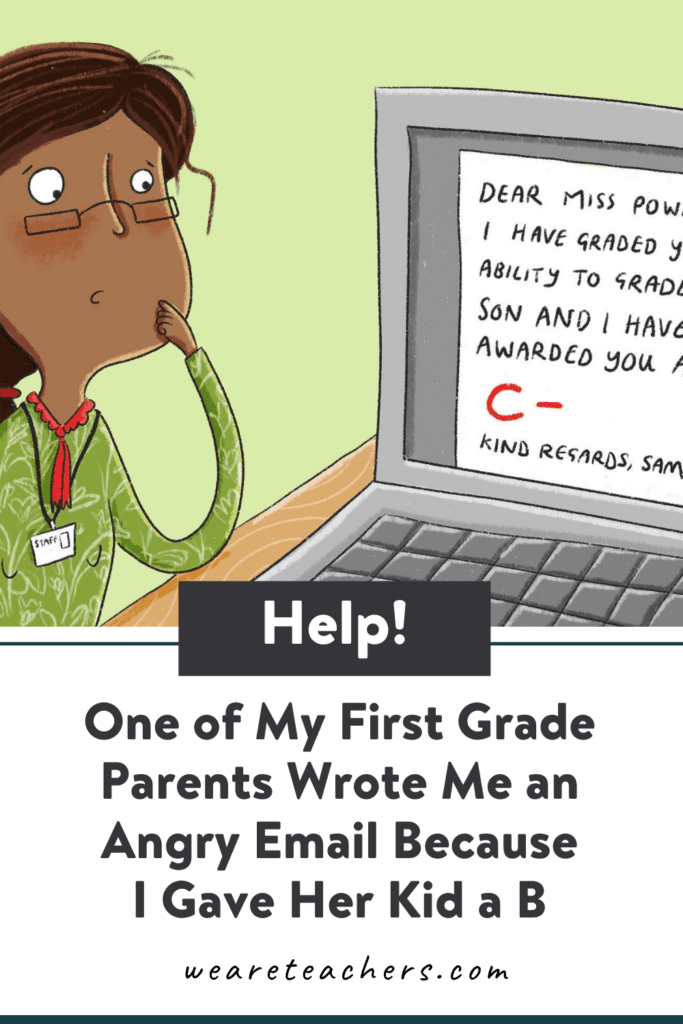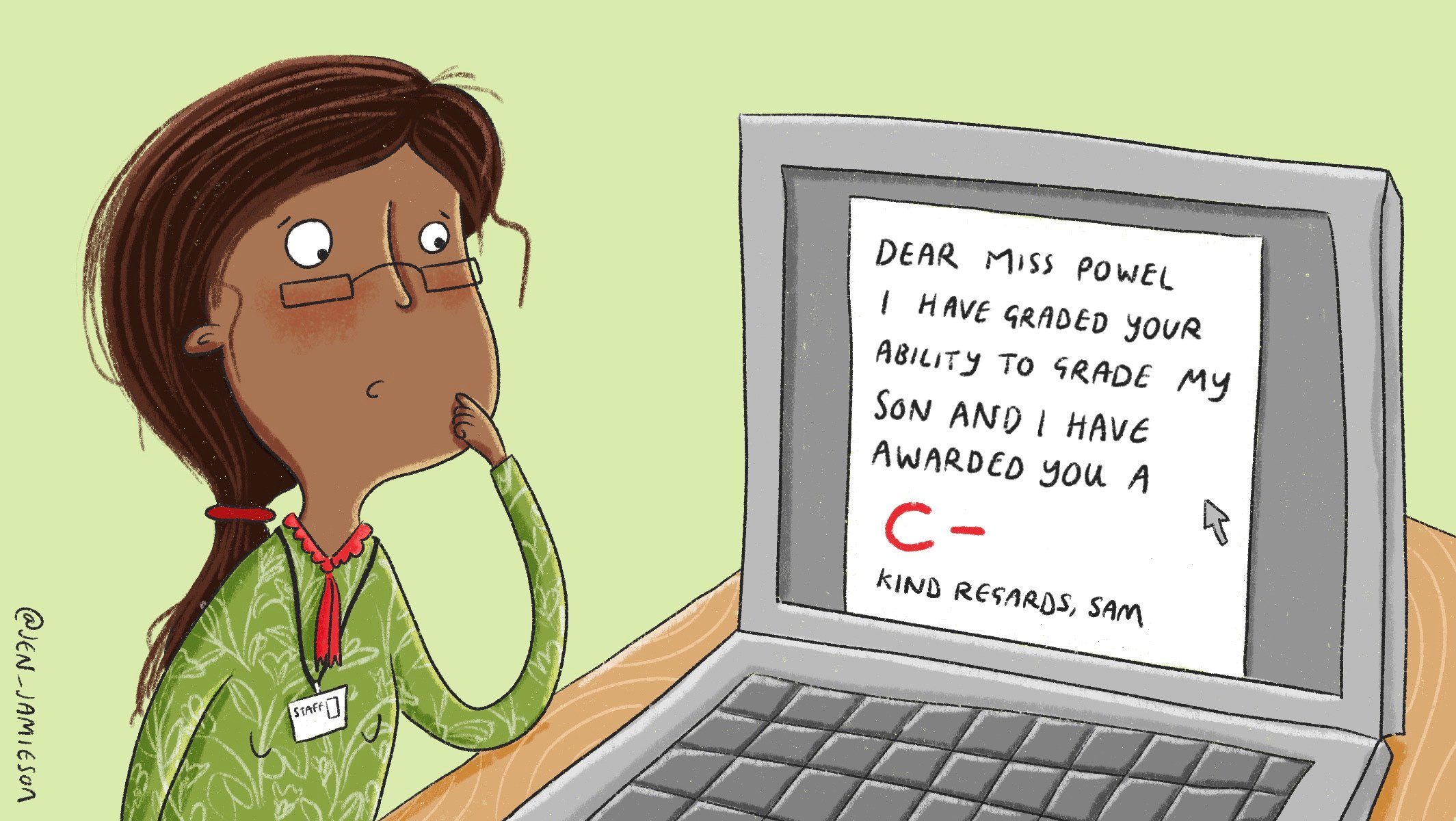Dear WeAreTeachers:
I have a parent that writes me angry paragraphs every time I give her 1st-grade child anything other than an A. She happens to be a high school educator. I’ve always felt a little nervous about having other teachers’ children. You’d think we’d be more supportive and understanding of each other, but it doesn’t feel that with this parent/teacher. What options can you think of to help me? —Hello Helicopter Parents
Dear H.H.P.,
Teaching other teachers’ kids often brings up feelings of uneasiness, and you might feel like you are under the microscope and judged. It can also be challenging to be upfront about issues that arise with their kids. Additionally, when parents hover, fixate on grades, and express anger, it is extra intimidating and draining to deal with. Hang in there, and let’s envision some possible ways to respond.
Michael Linson, a San Diego educator, offers up some advice on handling parents who complain about grades. Here are four steps that allow the coexistence of your compassion to caregivers and integrity about student progress:
First, speak to the parent over the phone or, better yet, in person. Human-to-human interaction helps build trust and effective communication. Since the parents have expressed anger, it’s helpful to invite another colleague or admin to be there for support. Next, listen well and seek understanding about the crux of the complaint. Try and be open. It doesn’t mean you agree. Then, show why you graded the student the way you did. Be sure to provide examples of student work to help the parents visualize how their child is progressing in relation to grade-level goals. Lastly, come to a consensus together on ways to help the student build confidence and independence.
I know it’s challenging and nerve-racking to engage with an angry and controlling parent. Therefore, be sure to take the time to calm yourself as best you can. It’s super helpful to keep records of all of your interactions and maintain a focus on student evidence of learning. Be mindful to use strength-based language to describe what the student CAN do and ideas for the next steps that are responsive to the needs of your students. It’s so powerful to model the value of taking risks and how mistakes are opportunities for growth. Also, it’s helpful to take anecdotal notes of your students’ learning in various content areas. When you follow through with these ideas, you are advocating for your students big time because helicopter parenting robs kids of learning to cope with disappointment and decreases their confidence.
I’d also like to take this opportunity to encourage all of us to reevaluate grading in general. Why are letter grades happening in first grade? First graders are at such an impressionable age, and schooling as a concept is still relatively new to them. When learning is viewed as inseparable from grades, we risk sending the message that students’ worthiness is related to grades. Letter grades with minimal feedback are NOT a good measure of someone’s capability. Let’s keep up the feedback and goal-setting with our students and deemphasize letter grades. We have the power as teachers to instill a love of curiosity and learning and affect how kids view education for the rest of their lives.
Dear WeAreTeachers:
I had a very difficult conversation with the admin team at my school yesterday. They are determined that I always need to have on my ‘poker face’ when I’m with the kids in the classroom. They said my students can never see me stressed or anxious. Seriously? I’m an expressive person. Good, bad, and everything in between. I don’t really wear a mask well. Of course, I don’t mean that I tell my students all the details of my life. It’s just that I don’t look 100 percent happy all day, every day. How should I navigate this? —I Don’t Play Poker
Dear I.D.P.P.,
You are a human being, and humans express emotions. Emotions are integral to classroom culture and foundational to all academic pursuits. Be human with an intentional spirit. Model self-awareness, self-management, social awareness, responsible decision making, and relationship skills. The organization, Collaborative for Academic, Social, and Emotional Learning (CASEL), describes the five social-emotional learning competencies in depth. CASEL emphasizes that “school classrooms sit at the center of the educational ecosystem. Students spend the majority of their school day in classrooms, and these spaces are at the heart of the learning process.”
Happiness, surprise, sadness, anger, fear, disgust are the commonly accepted basic emotions. Although emotions are similar across cultures, the expression of these emotions can vary. With over 7,000 facial expressions, it may feel like teachers walk “emotional tightropes” at school. Furthermore, it can feel wobbly when we have strong surging emotions in front of our students, their families, and staff members. It’s totally understandable that, at times ,you feel stressed and anxious. I say all teachers would nod their heads in agreement that they, too, experience the feelings you expressed.
Our energy is palpable in the classroom, and our roles carry great responsibilities. Kids are keen observers of our body language, tone of voice, and word choice. All of us as educators need to refine our situational awareness skills, build our emotional intelligence, and model how to manage big feelings with our students. According to Psychology Today, “Emotional intelligence refers to the ability to identify and manage one’s own emotions, as well as the emotions of others.” So, yes, express yourself and also practice strengthening your own emotional intelligence so that you foster deep connections, trusting relationships, and help learners build healthy and confident identities.
As teachers, we are faced with a barrage of intense emotions on a daily basis. Our well-being creates a ripple effect on all learners in our care. Maintaining a calm, consistent tone where we gently guide students is critical. How do you integrate social-emotional awareness into your day? Consider making it a goal to begin each day with a meaningful personal connection and check-in. Nurture a culture of kindness, and notice and name moments of compassion that you witness between your students. Leverage literature as a springboard to help your kids learn about themselves and care deeply about each other.
Hopefully, you have talked with your admin team about how you are feeling because we all know that an atmosphere where teachers feel empowered to use their voices moves mountains.
Dear WeAreTeachers:
Sometimes I don’t tell people how well things are going in my classroom because I get negative reactions. I don’t want to feel like I’m bragging. What I really want is to create connections where we all are rooting for each other. I implement “shout-outs” in my classroom, and it is really helping to highlight community and the positives. When I asked my administrator if we could do “shout-outs” at the end of our staff meetings, he said, “We don’t really have time, and do you really make a difference?” I’m feeling discouraged by those comments. How can I be the change I want to see at my site despite the lack of support? —Don’t Dim My Light
Dear D.D.M.L.,
Thank you for sharing your thoughts. Isn’t it beautiful when we find our people that bring out the best in each other, express shared joy, and let go of comparison and jealousy? I hope you magnetize people in your life that are able to cheer you on and share your wins and show up for the sorrows. We all have friends for all seasons and reasons in our lives. I know for me, the friends that authentically celebrate with me and stick with me through the hard stuff are deeply treasured.
It’s great that you talked to your administrator about the shout-outs. It’s worth bringing up again in the future, since it’s clear you really care about highlighting what’s going well and cultivating a positive culture at your site. You can also try giving shout-outs during your grade-level planning sessions. This setting may feel more organic. Meanwhile, keep it up in your classroom. I know you will!
Hopefully, our WeAreTeachers community will be inspired to launch or reignite shout-outs and gratitude in the classroom. How wonderful to hear that you are cultivating a classroom where students are highlighting what’s going well. This appreciative lens works magic!
Practicing gratitude can be a game-changer. And the more you bring attention to what you feel grateful for in your life, the more you will notice moments to feel grateful for! Some tips to get your gratitude practice up and running include being more observant, noticing the moments in your day when you say or think “thank you,” and shifting from habitual responses to infusing more pauses and intention to the moments of thankfulness you are experiencing. And this isn’t just for us educators; it’s for the students, too.
A classroom routine that I implement is the small and mighty daily gratitude journal, where students write three things that they are grateful for each day. Soon students start getting exciting during the day make comments like, “Ooooh, I’ll add how my friend helped me clean up the mess when I spilled the art supplies to my gratitude journal.”
bell hooks, an American author, feminist, professor, social activist, and cherished influence in my life, stated, “As a classroom community, our capacity to generate excitement is deeply affected by our interest in one another, in hearing one another’s voices, in recognizing one another’s presence.” Thank you for reminding us of the power of living with integrity and alignment while celebrating the amazingness that we see day in and day out in our classrooms and beyond.
Dear WeAreTeachers:
My family, friends, and neighbors keep asking me how it’s going in my classroom, and I’m tongue-tied. How do I, as a teacher, tell non-teachers why this year is harder and more difficult than other years? I feel like I’m being so negative, and I know it is not just me. Other teachers feel this way, too. Usually, I can reframe, but this year is beating me down. How might I respond when people push back and don’t believe this year could be worse than other years? —People Don’t Get It
Dear P.D.G.I,
Isn’t it fascinating how so many people sometimes feel like experts in education just based on being former students? As a university professor at the University of California at San Diego and teacher for over 28 years, I’ve run across many friends, neighbors, and family members who make sideways comments about teachers and their long vacations, great benefits, and more. You’ve heard it too, I’m sure!
In the book Option B: Facing Adversity, Building Resilience, and Finding Joy by Sheryl Sandberg and Adam Grant, the authors encourage us to change the question “How are you?” to “How are you TODAY?” The addition of the word “today” emphasizes how life changes day to day and moment to moment.
When people say that this year can’t possibly be any worse than the last couple of years, consider responding about how you feel today and not engaging in comparison to past years. If you respond about how you feel today, you can emphasize your feelings in the short term and hopefully let go of your worry that you may be perceived as negative when you are honest about what’s going on. You might share something like, “Today was a hard day. The COVID-19 protocols are exhausting to follow with kids. Even though they are trying, they aren’t consistent with social distancing, and their masks are falling down. I feel anxious because I don’t want to get my older family members sick, and it’s hard to focus on the job sometimes.”
Our work as teachers is beyond hard, and other people just don’t realize what it’s like to develop curriculum, plan, teach, assess, be responsive to the variability of our students’ needs, shape behaviors, interact with caregivers, and feel pressure for our students to excel on state assessments. The list of teacher responsibilities goes on and on!
Let’s try and think of this difficult time as a season of becoming. Yes, as a teacher, you are feeling tension, stress, overwhelm, and exhaustion. And poetry, if we let it, can help us experience validation and inspiration. It’s my sincere hope that poet Danielle Doby’s words will be a source of light for you.
do not fast forward
into something
you’re not ready for
or allow yourself
to shrink back
into what’s comfortable
growth lives in the uneasiness
the in-between
the unfinished sentence
you are a season
of becoming
Do you have a burning question? Email us at askweareteachers@weareteachers.com.
Dear WeAreTeachers:
Is it just me, or do these kids not have the same social skills as in years past? I know that our students were out of in-person school for almost two years. There are definitely gaps in their learning, but it’s their lack of social skills that is really causing a problem in the classroom. They interrupt me and one other constantly. They’re rude to school staff and even their friends. Most of the kids don’t know how to sit still. And it seems like it’s gotten especially bad in this lead-up to Winter Break for this group of 2nd grade kids. What can I do?Love our advice column? Visit our Ask WeAreTeachers hub.
Illustration: Jennifer Jamieson


